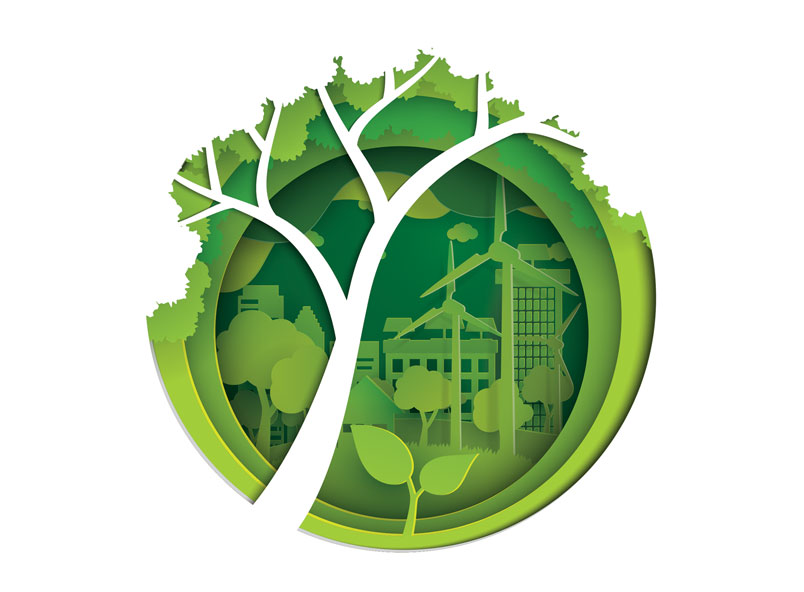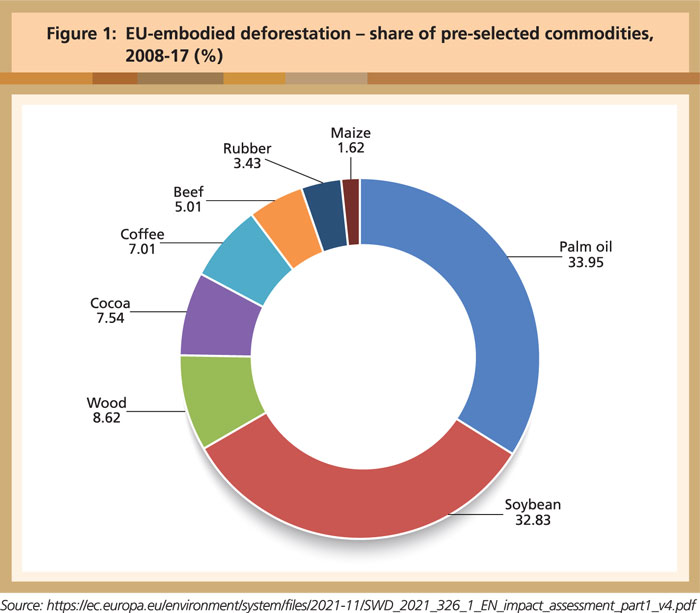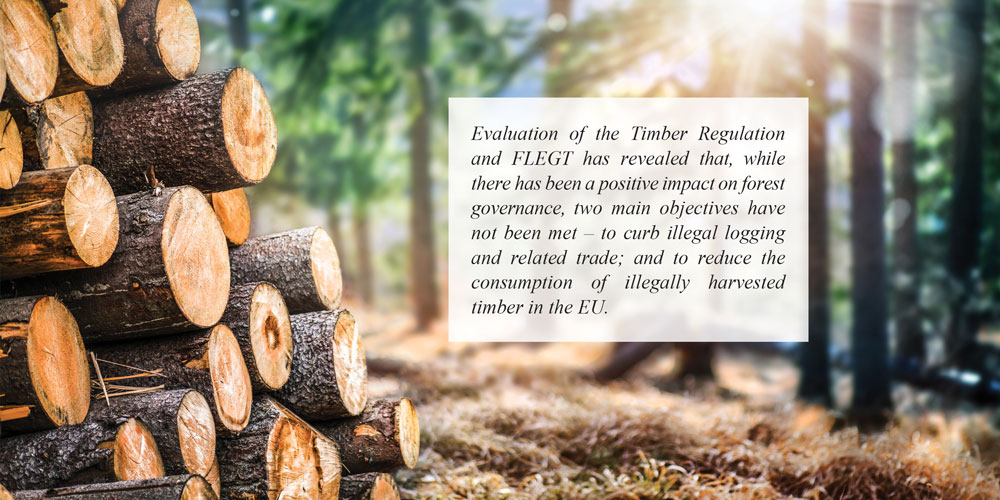



Palm oil in EU list of six
May, 2022 in Issue 1 - 2022, Markets
On Nov 17, 2021, the European Commission (EC) published its proposal to regulate commodities and products available in – or exported from – the European Union (EU) market, if these are associated with deforestation and forest degradation. As it stands, the scope will apply to palm oil and its products.
The EC first expressed this intention in its 2019 ‘Communication on Stepping up EU Action to Protect and Restore the World’s Forests’. The European Green Deal, as well as the EU Biodiversity Strategy for 2030 and the Farm to Fork Strategy, have since confirmed this commitment.
Additionally in the EU, there is an overall trend towards requiring business operators to establish and implement greater due diligence procedures. As such, the EC is also working on a directive on such measures that would apply to the broader supply chain, to ensure compliance with social and environmental standards.
Currently, when it comes to forests and timber, the EU legislative framework focuses on addressing illegal logging and associated trade, but does not address deforestation and forest degradation directly. The two main legal instruments in force are the Timber Regulation and the Regulation establishing a Forest Law Enforcement, Governance and Trade (FLEGT) licensing scheme for imports of timber into the EU.
Under FLEGT, the EU negotiates Voluntary Partnership Agreements with producer countries, to ensure that timber and timber products exported to the EU come from legal sources. Once a consignment is FLEGT-certified, this indicates the legality of the timber and relieves the exporter of further due diligence.
However, evaluation of the Timber Regulation and FLEGT has revealed that, while there has been a positive impact on forest governance, two main objectives have not been met – to curb illegal logging and related trade; and to reduce the consumption of illegally harvested timber in the EU. The evaluation concluded that only focusing on the legality of timber was not sufficient and that the Timber Regulation should be amended. The proposed Regulation will therefore repeal the Timber Regulation, while FLEGT will remain in place.
Six commodities selected
The EC argues that the proposed Regulation should cover those commodities whose consumption in the EU is the most relevant in terms of contributing to global deforestation and forest degradation.
As part of the study supporting the Impact Assessment for the proposed Regulation, an extensive review of scientific literature was carried out. This process delivered a first list of eight commodities, which was then reduced by comparing the estimated area of deforestation linked to EU consumption for each commodity with its average value of EU imports.
The EC concluded that six commodities represent the largest share of EU-driven deforestation among the eight analysed – palm oil, soybean, wood, cocoa, coffee and beef, as well as maize and rubber (Figure 1).

The EC said maize and rubber account for the smallest fractions of the commodities analysed, but that their trade volumes are very large. Therefore, it concluded that including the two commodities in the scope of the future Regulation would require a very large effort and significant financial and administrative burden, with limited return in terms of reducing deforestation driven by EU consumption.

With respect to palm oil and its products, Annex I of the proposed Regulation lists the following products and related tariff lines:
The EC will undertake a first review within two years of the rules coming into force. Further reviews are to be made at regular intervals, thereby allowing for progressive amendment of the rules or for the extension of the product scope.
As part of the review, the EC is required to present a report to the European Parliament and the Council of the EU (Council), to be accompanied, if appropriate, by a legislative proposal. The report is to ‘focus in particular on an evaluation of the need and the feasibility of extending the scope of this Regulation to other ecosystems, including land with high carbon stocks and land with a high biodiversity value such as grasslands, peatlands and wetlands and further commodities’.
Global NGOs, such as Greenpeace and the World Wide Fund for Nature, have strongly criticised the exclusion of non-forest ecosystems, such as savannahs and wetlands, in the proposal. While the review and extension of the product scope may contribute to making the rules less selective and discriminatory, the reliance on EU-developed concepts like ‘land with high carbon stocks’ and ‘land with a high biodiversity value’ is questionable, as they are not supported by science and related research – and hence, no global definitions and benchmarks exist.
Due diligence approach
The EC emphasises that the selected commodities and products should not be placed or made available in – or exported from – the EU unless they are deforestation-free, and have been produced in accordance with the relevant legislation of the producer country.
Operators will therefore be required to establish and implement due diligence procedures to confirm compliance. To ensure this, the EC proposes the attachment of a due diligence statement, to confirm that no risk – or only a negligible risk – has been found. The statement is to contain detailed information on the goods and the economic operator. This approach has been followed under the Timber Regulation.
More specifically, the due diligence procedure laid out in the proposed Regulation is to include three elements:
Where a risk is identified, operators are to mitigate it to achieve no risk or a negligible risk. Once this is done, the operator will be allowed to place the relevant commodity or product on the EU market or to export it from the EU.
Third-party certification or other third-party verified schemes may be used in the risk assessment procedure, but should not substitute the operator’s responsibility in terms of due diligence. For the relevant commodities entering or leaving the EU market, the proposed Regulation tasks competent authorities with the verification of compliance via periodic checks. The reference of a due diligence statement will have to be made in the Customs declaration.
Country benchmarking system
The proposed Regulation is to combine the due diligence requirement with a benchmarking system that takes into account the producer country’s engagement in tackling deforestation and forest degradation.
The objective is to ‘incentivise countries to ensure stronger forest protection and governance, to facilitate trade and to better calibrate enforcement efforts by helping competent authorities to focus resources where they are most needed, and to reduce companies’ compliance costs’.
The countries will be placed in a low, standard or high risk category. The obligations of operators and EU authorities will vary according to the level of risk – with simplified due diligence duties for low-risk countries and enhanced scrutiny for high-risk countries. When the Regulation first takes effect, all countries will be assigned a standard level of risk, which is then subject to change.
A list of the countries that present a low or high risk will be published. The categorisation of risk will be based on the rate of deforestation and forest degradation; the rate of expansion of agriculture land for the relevant commodities; and production trends of relevant commodities and products.
The EC will further take into consideration any agreements concluded between the EU and producer countries that address deforestation or forest degradation; agreements that facilitate compliance with the proposed Regulation; and whether laws are in place in producer countries to enforce measures against deforestation and forest degradation, in particular ‘whether sanctions of sufficient severity to deprive of the benefits accruing from deforestation or forest degradation are applied’.
The proposed Regulation will now follow the EU’s ordinary legislative procedure and will have to be agreed and adopted by the European Parliament and the Council. Both institutions will develop their respective positions before entering into ‘trilogue’ negotiations with the assistance of the EC. Substantial changes to the proposed Regulation can be expected during these discussions.
While it is a welcome change that the EU has not targeted a single commodity like palm oil or timber this time around, the proposed mechanism still leaves a wide margin for discrimination of selected commodities and the countries where they are produced.
Producers of the targeted commodities should carefully assess the proposed Regulation and ensure that their positions are duly taken into account. A feedback period on the proposed Regulation will be opened soon by the EC and interested stakeholders should use this platform before the ‘trilogue’ negotiations are launched.
Uthaya Kumar
MPOC Brussels
